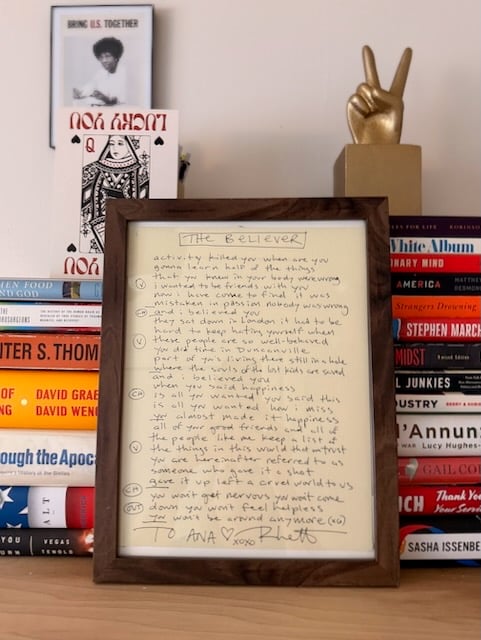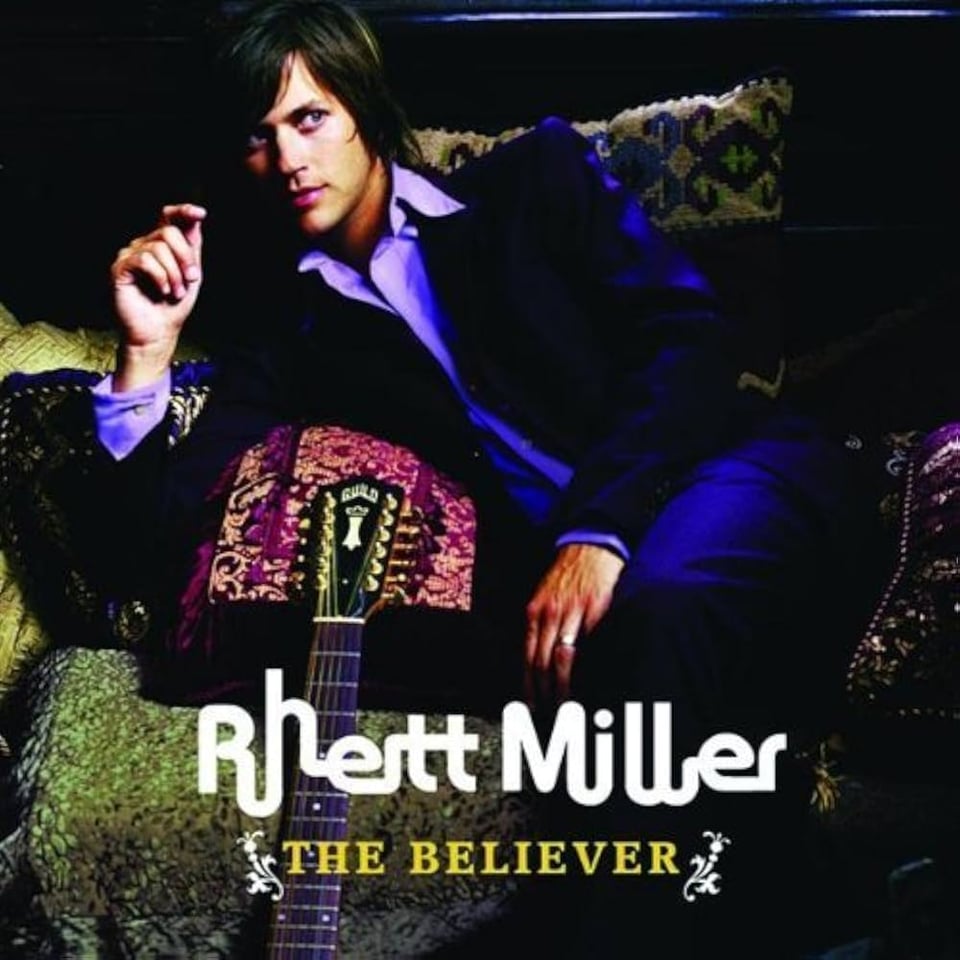Politics | Recovery | Current Obsessions
This is going to get weird

The Greatest Rock and Roll Band in the World
This week's guest on Past Due is Rhett Miller, frontman of the Old 97's with an equally illustrious career as a solo artist who just happens to have a new album out at this very minute.
Still, millions of people might know him best as the lead singer of Bzermikitokolok and the Knowheremen—the band featured in the Guardians of the Galaxy Holiday Special, singing "I Don't Know What Christmas Is (But Christmastime Is Here)." On the pod, Rhett told the story of how he came to serenade Chris Pratt from under a trowel of prosthetics, starting with getting to know Gunn after the director featured the Old 97s in the soundtrack to his 2006 ebullient gross-out horror, Slither.
After ten years of friendship, Rhett goes to visit Gunn on the set of The Suicide Squad. As each of the enormous stars in that movie passes by, Gunn introduces Rhett: "This is Rhett Miller, he sings in my favorite band, the greatest rock and roll band in the world." After a full day of this, Rhett realizes something:
Oh, he doesn't think of me as some annoying guy that hit him up to visit the set that day. My work over the years has meant something to him and still does.
"So even though I was nervous to say it," Rhett recounts, he winds up telling Gunn, "I admire what you're doing so much. And if there's ever any space in your world for me, I'll do whatever you want. I think you're so brilliant and cool and you know, whatever. If you can ever fit me in, I'm up for it."
And, a few years later, there's Rhett and the rest of the band singing a total earworm of a Christmas song that he and Gunn wrote together. And couple of years after that, Rhett is having lunch with Gunn in Atlanta as his friend's movie blows the doors off of summer's end.
The Art of Not Making It Weird
When you meet a talented and famous person at a black-tie party or on a rope line or formally interview that person (I get to do that, it's awesome), it's easy to be effusive: "Your performances and your off-camera advocacy have inspired me my whole life." "Your example helped me get sober." "I read your book so much the covers fell off. " "You made me want to be a writer." They thank you, you get to glow a bit (and maybe a selfie). The end.
Meet someone more informally—friend of a friend, maybe at a point in your career when things feel more equal—and it gets trickier. It’s an internal dance. You don't want to throw the relationship off balance.
I met Rhett as a friend-of-a-friend and he became a friend because he made it easy. He's charismatic, generous, warm, genuine, and thoughtful. We've stayed friendly for almost 20 years. I know he knows I'm a fan. But I haven't spoken to him much about his music since we made it past the initial awkward stage. I've always assumed he knows how much I love it.
Besides, what connects us now isn’t just friendship or fandom. It’s the shared terrain of trying to survive, and create, and stay upright. When he was on Past Due, he talked about getting sick, dealing with insurance, and being successful enough that people think he's wealthy though he is very much not.
Rhett's been making music long enough to have a story about the music industry when the getting was good. On the pod, he told the story of his most expensive album: Verve Records gave him $350,000 to make it and, he said, it's all right there in the grooves. Hired George Drakoulias to produce; recorded it at the legendary Sound City; got the top session musicians. That money paid for his wife and kids to stay with him in an apartment near the studio.
And then the most expensive record Rhett ever made didn't produce a hit. A couple of months after its release, the president of the label called: "I'm trying to do the right thing here by calling you. I just want you to know that the record is dead." ("I never thought about that terminology before," Rhett said. Dead.)
No more support for it. No good money after bad.
We Almost Made It

The album Rhett was telling us about is 2006's The Believer. I was listening to him tell this story while looking at a framed copy of Rhett's handwritten lyrics to the title song. I asked him for them a few years ago.
It's my favorite song on what is a top-ten album for me. I love the Old 97's a lot, a whole lot, but Rhett's solo work is so true to his voice: Literally, his voice. It soars and fills the corners in a way that alt-country just doesn't make room for.
Rhett's wearing a velvet suit on the album cover and of course he is. A velvet suit is lush; slightly corny. Velvet can be sexy but that's only because it so deeply felt. You want to touch it. And as an album, The Believer is richly orchestrated, delightfully pop ("I Believe She's Lying," a solo version of "Singular Girl") and beautifully sly ("Fireflies"). It's an album by rock star holding something delicate inside. Something vulnerable that could be, let's say, crushed.
The title song is an elegy for Elliott Smith, the brilliant singer-songwriter who died by suicide a few years before The Believer came out.
When you said happiness
Is all you wanted
You said this
Is all you wanted
How I miss
We almost made it
Happiness
In an interview he gave at the time, Rhett said, “I had a really serious suicide attempt when I was fourteen, so I know his despair."
And so do I.
That song was a soundtrack to a dark, dark time for me. I remember sitting in my car outside my house, having driven home drunk (knowing I shouldn't have driven). Sitting in the car and afraid to go inside, where my husband would be angry with me (justifiably so) and I'd have to sit with that anger or, best case scenario, he'd be asleep and I could drink some more. I hated my life and who I was and wasn't sure if it would ever be any different. I'd listen to that song, so full of yearning for someone so treasured and loved. I cried and cried and cried because I missed (and miss) Smith, too, if only as a fan1. I cried because the song expresses so perfectly love for beauty that could have been.
And I cried because I didn’t think that if I disappeared, anyone would miss me.
Yet the song kept me going because it's not just a song about mourning. It's about the specific grief that comes when someone takes themselves out of the world. That kind of grief contains anger. Betrayal.
All of your good friends
All of the people like me keep a list of the things in this world that we trust
You are here in after referred to as someone who gave it a shot, gave it off, left the cruel world to us
It's not exactly rage but it has that passion. A pulling grief. The kind that says: We almost made it, you fucking asshole. Why didn't you pull through, for us? Rhett isn't judging him, but he's not letting Smith go easily, either. And somehow, that made it easier for me to not let go of myself.
It took me another few years and even darker times before I got sober. But that song got me through to the next thing that got me through to the next thing. I wouldn’t be here without it.
I can’t listen to it much anymore. It was a lifeline. Now it’s an anchor. The lyrics are on my wall because they keep me here.
A lyric I never thought about much until Rhett told that story: “I wanted to be friends with you.”
Context-specific Meaning
I think Past Due is a wonderful podcast and we've had all kinds of meaningful conversations but if the only thing I ever get out of it was to tell Rhett what that album means to me, that will be enough.
(And I need to stress here the whole album is phenomenal and the darkness of "The Believer" is a thread and not the whole cloth. The song itself is not some maudlin ballad, either. It’s a rock song, just not shy about its feelings.)
But here's what Rhett said in reply: “When I think about The Believer, I only think about it as a failure. To me, not even commercially, artistically. I think I did something wrong."
It's impossible to live your life without feeling the context, you know? And so I've always felt that all of the context around that record was failure.
And that what capitalism does to artists: teaches us to disregard what we made if it didn’t pay back the advance.
I had been angry at the record company but, for a flash, I was angry at Rhett, too. What the fuck? Don't people tell him all the time what that song means to them? I asked for the lyrics! Doesn't he know he did something great? There's that song, and "Brand New Way," and "Aint That Strange," and "Meteor Shower." He made fucking art, is what he did. Art that stung me through a thick layer of booze, drugs, self-loathing, and self-destruction.
I also get it.
I’ve done work that other people have told me they loved but that I can't love myself because, well, it didn't land like I wanted it to. It landed with echoes different than what I had heard in my head when I made it. When you do something for long enough—and get paid just enough to keep doing it—you forget what a miracle it is that anyone’s listening.
There's a spiral here: Rhett wrote a song for someone who couldn't see his own worth. Then Rhett created something whose worth was invisible to him—but it kept me standing until I could see my worth.
Art moves between people like that—quietly, powerfully, often without anyone knowing.
But what a gift it is to let them know. Rhett's James Gunn story would fit in a Ted Talk about the power of "the ask" or some such, maybe. My argument to you today is this: When you risk making it weird with unadulterated praise of a friend, going really overboard with how much their work means to you, the real reward isn't getting to do something cool later. The real reward is just getting to say it.
Sometimes telling someone they saved your life is more important than protecting the friendship from awkwardness.
Isn’t friendship always just saving each other’s lives over and over again?
I didn’t send this to Rhett before publishing. Maybe he’ll see it. Maybe he won’t.
I’m pressing send anyway. I’m making it weird.
Also? The episode with Rhett is out today for patrons. Rhett is having an album release concert on Wednesday and the album is available for purchase now. Consider supporting the people who make things you love.
There are too many ironies to fit into this piece neatly, so I’ll add one here: Back in the late 1990s, I met Smith a few times in the same sort of friend-of-a-friend context I met Rhett. I did not ever say to him how much I loved his music beyond something like, “Oh, I’m a big fan.” That’s on me. ↩
You just read issue #33 of AMC All the Time. You can also browse the full archives of this newsletter.
